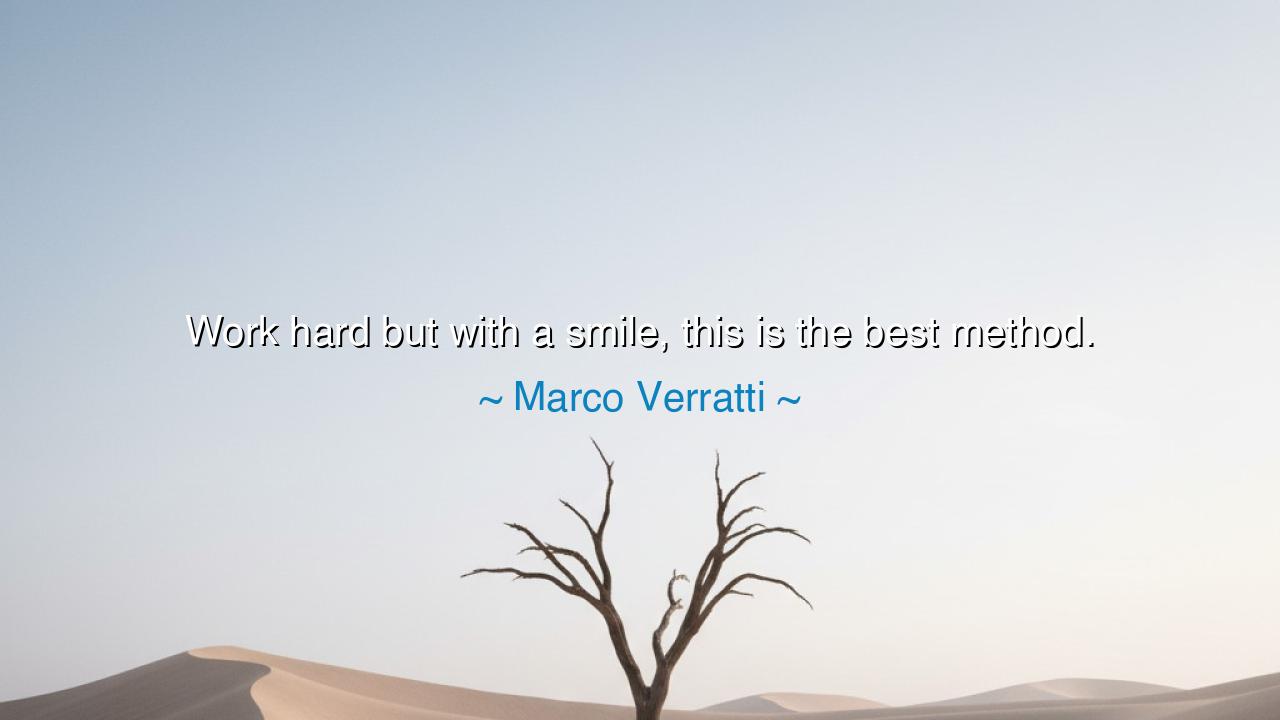
Work hard but with a smile, this is the best method.






Hear the simple yet profound words of Marco Verratti: “Work hard but with a smile, this is the best method.” At first glance, these words may appear as the counsel of an athlete speaking only of the field, of sweat, and of training. Yet if we gaze deeper, we see the reflection of ancient wisdom shining within them. For it is not toil alone that elevates a man, nor labor pursued with grim severity, but the union of effort and joy. To work hard is to shape one’s destiny; to smile while doing so is to walk the path with light in the heart.
The ancients often spoke of toil as the forge of greatness. The blacksmith bends iron to his will, the farmer turns the soil, the soldier endures long marches beneath the sun. Without labor, no empire rises, no harvest comes, no victory is won. Yet the same ancients also taught that bitterness in labor corrodes the soul. A man who works only with heaviness becomes like a beast of burden, bowed under weight. But one who smiles as he labors transforms his work into art, his sweat into offering, his burden into joy. Thus, Verratti’s saying echoes the eternal balance: effort must be married to spirit.
History gives us many who embodied this truth. Consider Leonardo da Vinci, who poured endless hours into sketching machines, studying anatomy, and painting visions upon canvas. His labor was immense, his notebooks filled with restless attempts. Yet his spirit was playful, his curiosity alive, his heart light as he worked. It was not mere effort, but effort infused with wonder, that birthed works like the Mona Lisa. Leonardo worked hard with a smile, and thus his legacy still shines centuries later.
Contrast this with those who grind without joy. The Pharaohs built pyramids through endless toil, yet the forced laborers groaned in misery. Their work produced monuments, but their spirits were crushed beneath the lash. The lesson is plain: greatness built on bitterness does not endure in the soul of the worker. True greatness is that which uplifts even as it demands. When Verratti speaks, he counsels not only athletes, but all who labor: let the heart remain light, even as the body grows weary.
To smile in labor is not to ignore hardship, but to transmute it. The smile is the alchemy of the spirit: it turns fatigue into purpose, monotony into rhythm, and suffering into strength. The smile says, “I choose joy even here, even now.” In this way, the worker is no longer a slave to the task, but master of it. He does not merely endure—he thrives, he inspires, and his presence itself becomes a beacon to others.
The lesson is clear. Work is the path by which we carve meaning into the world. But if we walk it with bitterness, we poison the journey. If we walk it with joy, we bless both ourselves and those around us. Therefore, let every man and woman seek not only to labor, but to labor cheerfully. Greet your tasks not with complaint, but with gratitude. Remember that the farmer’s plow feeds nations, the teacher’s pen shapes minds, the craftsman’s hands give beauty to daily life. To each, the smile is the crown upon the labor.
In practice, begin each day with intention: choose one task, however difficult, and resolve to approach it with cheer. When fatigue weighs heavy, pause and smile—not as false display, but as reminder that your effort has meaning. Encourage others with your example; lift their spirits by showing that hardship need not erase joy. And above all, remember that to work hard with a smile is not simply a method for success, but a way of living nobly, harmoniously, and with dignity.
Thus, Verratti’s words become a torch passed down: effort without joy is slavery; joy without effort is emptiness; but work hard with a smile—and you hold in your hands the best method, the method that unites body, heart, and spirit into one shining force. This is the teaching to carry forward, for yourself and for all generations to come.






AAdministratorAdministrator
Welcome, honored guests. Please leave a comment, we will respond soon